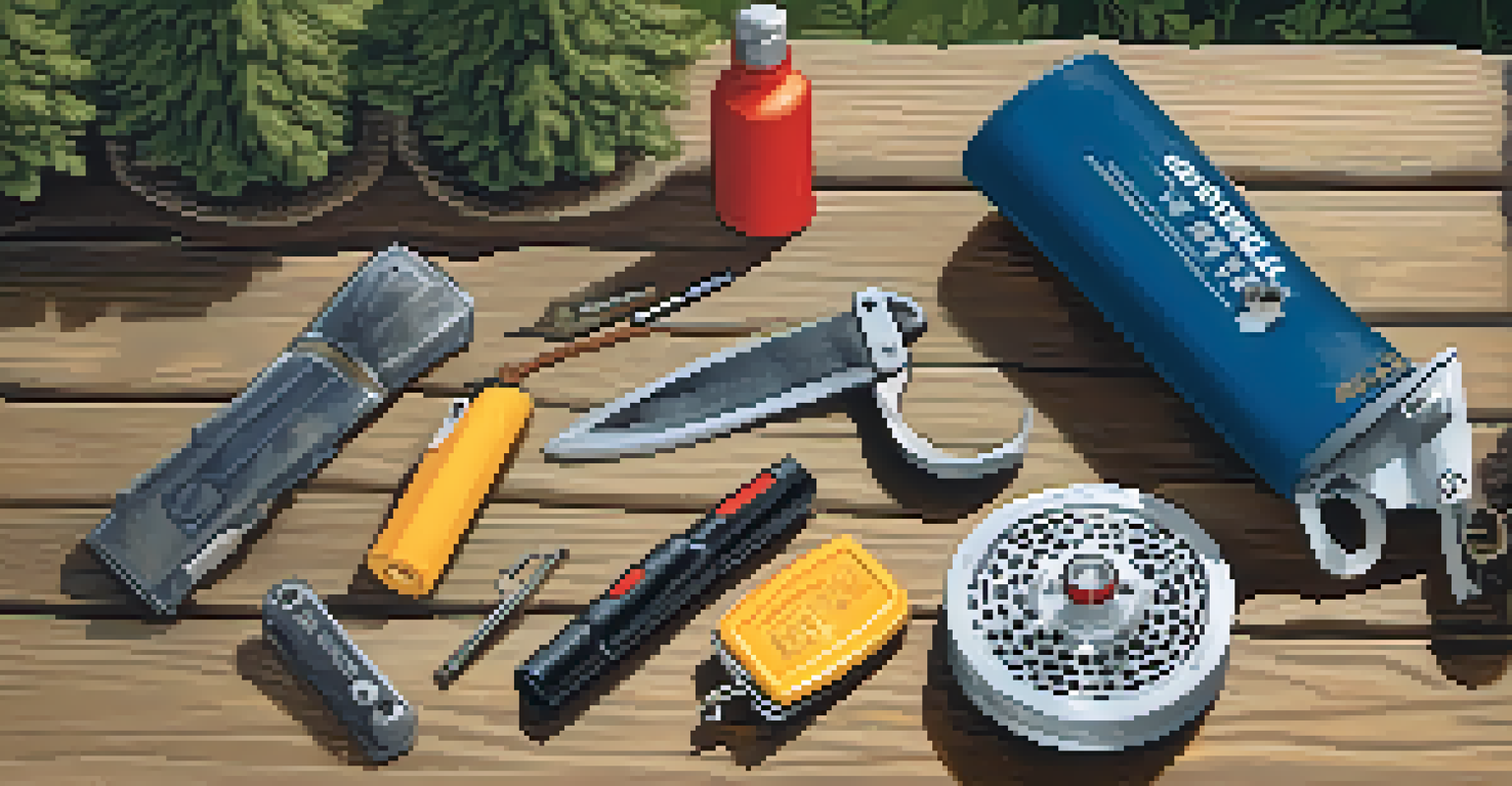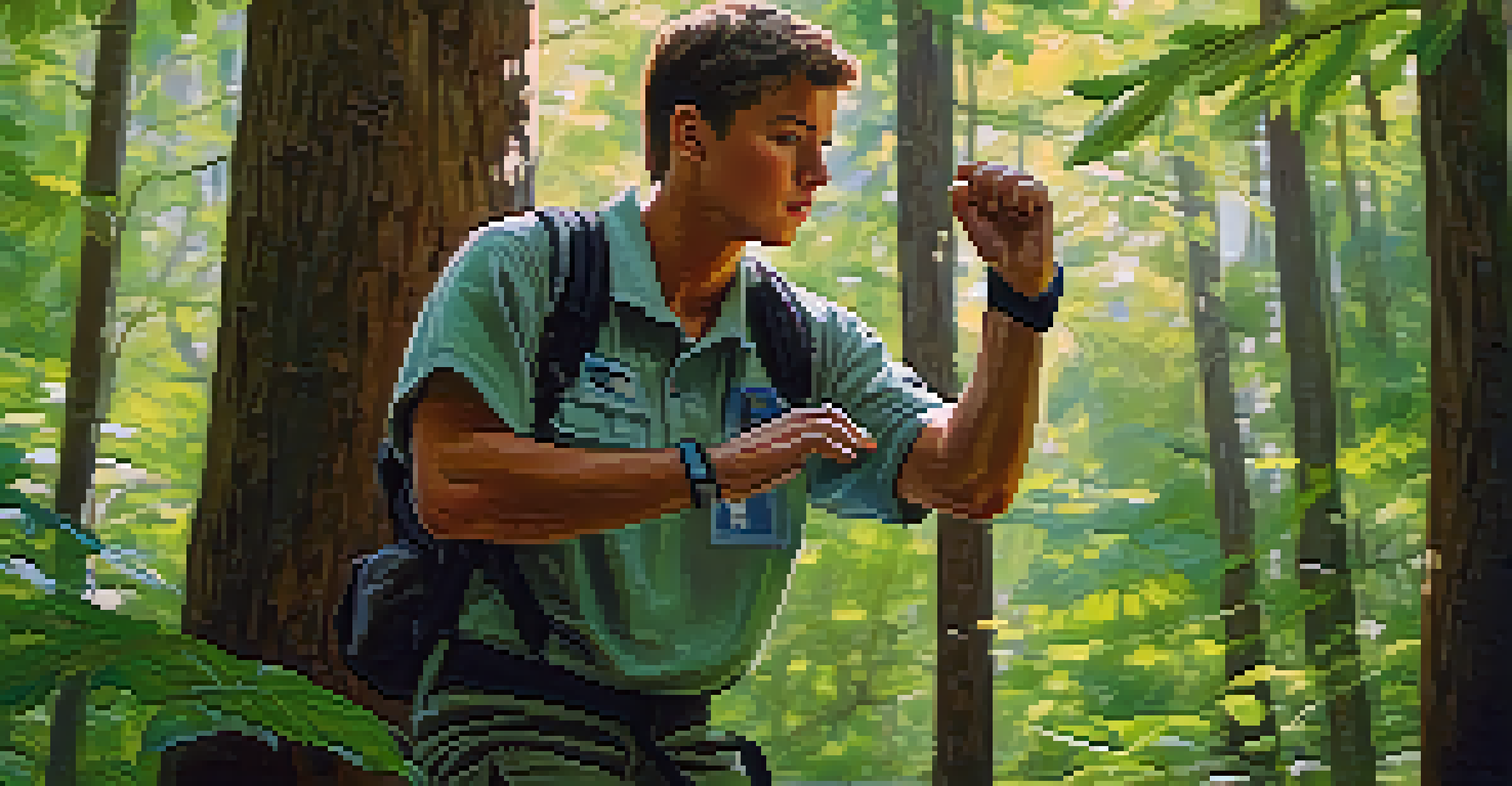Self Defense Strategies for Campers: Stay Prepared

Understanding the Importance of Self Defense for Campers
When you venture into the great outdoors, your safety should always be a priority. Campers often find themselves in remote locations where help may be miles away, making it crucial to have self-defense strategies in place. Understanding the potential risks can empower you to take proactive steps for your safety.
The only thing necessary for the triumph of evil is for good men to do nothing.
Self-defense isn't just about physical confrontations; it's also about awareness and preparation. Knowing your surroundings and being alert can often deter potential threats before they escalate. By adopting a self-defense mindset, you’re not only protecting yourself but also enhancing your overall camping experience.
Moreover, learning self-defense techniques can build your confidence. Whether it's a bear encounter or an unwelcome human presence, knowing how to respond can make all the difference. Remember, being prepared is the best way to enjoy your time in nature without unnecessary worry.
Essential Gear for Self Defense While Camping
Having the right gear can significantly enhance your safety while camping. Consider carrying items such as a whistle, pepper spray, or even a personal alarm. Each of these tools can serve as an effective deterrent in a threatening situation, allowing you to attract attention or defend yourself if necessary.

Additionally, a sturdy multi-tool can be an invaluable asset. Not only can it help with everyday tasks, but it can also serve as a makeshift weapon if the need arises. Investing in quality gear can provide peace of mind when you're out in the wilderness.
Prioritize Safety While Camping
Understanding self-defense and being prepared can enhance your camping experience and keep you safe.
Remember, the goal is to feel secure while enjoying nature. Having the right equipment at your disposal can make all the difference, allowing you to focus on the beauty around you rather than potential dangers.
Situational Awareness: Your First Line of Defense
Situational awareness is the cornerstone of self-defense. It involves being conscious of your surroundings and recognizing potential threats before they become a problem. Always take a moment to scan your environment when you arrive at a campsite or when you're out hiking.
By failing to prepare, you are preparing to fail.
Make it a habit to observe the people around you and their behaviors. If something feels off, trust your instincts and take precautions, such as moving to a more populated area or checking in with fellow campers. Awareness is your best defense against unexpected situations.
Moreover, being aware of wildlife can also enhance your safety. Familiarize yourself with the types of animals in the area and their behaviors. This knowledge can help you avoid encounters and respond appropriately if they occur.
Basic Self Defense Techniques Every Camper Should Know
While it's ideal to avoid confrontation, knowing some basic self-defense techniques can be invaluable. Simple moves like how to break free from a wrist grab or how to create distance from an aggressor can help you escape a dangerous situation. Consider enrolling in a self-defense class tailored for outdoor enthusiasts.
Practicing these techniques not only prepares you physically but also mentally. The more familiar you are with these skills, the more confident you'll feel should an emergency arise. Even role-playing scenarios with friends can help reinforce your knowledge.
Essential Self-Defense Gear
Carrying the right tools, such as pepper spray and whistles, can provide peace of mind and effective deterrents in emergencies.
Remember, the goal is to escape and seek help. Self-defense is not about fighting but rather about finding a way out of a potentially harmful situation.
Creating a Safety Plan with Your Camping Group
Before you embark on your camping adventure, it's essential to create a safety plan with your group. Discuss potential risks, establish communication methods, and designate specific roles in case of an emergency. Having a clear plan can ensure everyone knows what to do if something goes wrong.
Incorporating regular check-ins can also enhance your group's safety. Decide on specific times to regroup and share any concerns or observations. This practice not only fosters teamwork but strengthens the bond among campers.
Moreover, sharing your itinerary with someone outside your group can provide an extra layer of security. If something goes awry, having someone aware of your plans can facilitate quicker response times.
How to Respond to Wildlife Encounters
Wildlife encounters can be both thrilling and frightening. Knowing how to respond can make all the difference in ensuring your safety. For instance, if you come across a bear, it's crucial to remain calm, avoid direct eye contact, and slowly back away. Making noise can help alert the animal to your presence without provoking it.
Research the wildlife common in the area you'll be camping. Understanding their behavior will help you react appropriately. For example, knowing how to handle a snake encounter can prevent panic and lead to safer outcomes.
Create a Safety Plan Together
Establishing a safety plan with your camping group ensures everyone knows their roles and enhances overall security.
In some cases, carrying bear spray can provide peace of mind. It can be a life-saving tool if you find yourself too close for comfort. Always prioritize prevention by securing food and trash properly to avoid attracting wildlife.
Emergency Contacts and Resources for Campers
Before heading out, ensure you have access to emergency contacts and resources. Familiarize yourself with the nearest ranger station, hospital, or emergency service in the area. Having this information on hand can be crucial in case of an emergency.
Consider downloading offline maps or camping apps that provide emergency resources and contacts. Many of these tools can work without cell signal, ensuring you have access to critical information even in remote areas.

Additionally, always carry a basic first aid kit and know how to use it. Being prepared for minor injuries can help you stay calm in a crisis and focus on your safety.